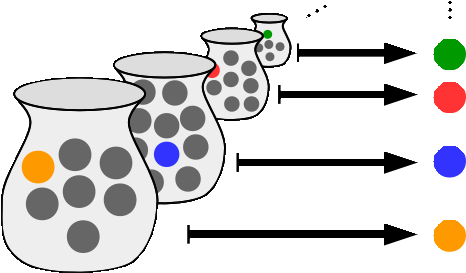|
Philip Jourdain
Philip Edward Bertrand Jourdain (16 October 1879 – 1 October 1919) was a British logician and follower of Bertrand Russell. Background He was born in Ashbourne in Derbyshire* one of a large family belonging to Emily Clay and his father Francis Jourdain (who was the vicar at Ashbourne). His sister Eleanor Jourdain was an English academic and author. Another sister, Margaret (1876–1951), was an authority on the history of fine English home-furnishings, and the life-long companion of the novelist Ivy Compton-Burnett. Mathematics and logic Jourdain was partly disabled by Friedreich's ataxia. He corresponded with Georg Cantor and Gottlob Frege, and took a close interest in the paradoxes related to Russell's paradox, formulating the card paradox version of the liar paradox.History and Root of the Principle of Conservation of Energy* 1915: Ernst MacThe Science of Mechanics* 1915: Georg Cantorbr>Contributions to the Foundation of the Theory of Transfinite Numbers References * Ivor ... [...More Info...] [...Related Items...] OR: [Wikipedia] [Google] [Baidu] |
Ashbourne, Derbyshire
Ashbourne is a market town in the Derbyshire Dales district in Derbyshire, England. Its population was measured at 8,377 in the 2011 census and was estimated to have grown to 9,163 by 2019. It has many historical buildings and independent shops. The town offers a historic annual Shrovetide football match. Its position near the southern edge of the Peak District makes it the closest town to Dovedale, to which Ashbourne is sometimes referred to as the gateway. The town is west of Derby, south-east of Buxton, east of Stoke-on-Trent, south-south-east of Manchester, south-west of Sheffield and north of Lichfield. Nearby towns include Matlock, Uttoxeter, Leek, Cheadle and Bakewell. History The town's name derives from the Old English ''æsc-burna'' meaning "stream with ash trees". Ashbourne was granted a market charter in 1257. In medieval times it was a frequent rest stop for pilgrims walking "St Non's Way" to the shrine of Saint Fremund at Dunstable in Bedfordshire. T ... [...More Info...] [...Related Items...] OR: [Wikipedia] [Google] [Baidu] |
Ludwig Wittgenstein
Ludwig Josef Johann Wittgenstein ( ; ; 26 April 1889 – 29 April 1951) was an Austrian-British philosopher who worked primarily in logic, the philosophy of mathematics, the philosophy of mind, and the philosophy of language. He is considered by some to be the greatest philosopher of the 20th century. From 1929 to 1947, Wittgenstein taught at the University of Cambridge. In spite of his position, during his entire life only one book of his philosophy was published, the 75-page ''Logisch-Philosophische Abhandlung'' (''Logical-Philosophical Treatise'', 1921), which appeared, together with an English translation, in 1922 under the Latin title ''Tractatus Logico-Philosophicus''. His only other published works were an article, "Some Remarks on Logical Form" (1929); a book review; and a children's dictionary. His voluminous manuscripts were edited and published posthumously. The first and best-known of this posthumous series is the 1953 book ''Philosophical Investigations''. A su ... [...More Info...] [...Related Items...] OR: [Wikipedia] [Google] [Baidu] |
1879 Births
Events January–March * January 1 – The Specie Resumption Act takes effect. The United States Note is valued the same as gold, for the first time since the American Civil War. * January 11 – The Anglo-Zulu War begins. * January 22 – Anglo-Zulu War – Battle of Isandlwana: A force of 1,200 British soldiers is wiped out by over 20,000 Zulu warriors. * January 23 – Anglo-Zulu War – Battle of Rorke's Drift: Following the previous day's defeat, a smaller British force of 140 successfully repels an attack by 4,000 Zulus. * February 3 – Mosley Street in Newcastle upon Tyne (England) becomes the world's first public highway to be lit by the electric incandescent light bulb invented by Joseph Swan. * February 8 – At a meeting of the Royal Canadian Institute, engineer and inventor Sandford Fleming first proposes the global adoption of standard time. * March 3 – United States Geological Survey is founded. * March 11 – Th ... [...More Info...] [...Related Items...] OR: [Wikipedia] [Google] [Baidu] |
Mind (journal)
''MIND'' is a quarterly peer-reviewed academic journal published by Oxford University Press on behalf of the Mind Association. Having previously published exclusively philosophy in the analytic tradition, it now "aims to take quality to be the sole criterion of publication, with no area of philosophy, no style of philosophy, and no school of philosophy excluded." Its institutional home is shared between the University of Oxford and University College London. It is considered an important resource for studying philosophy. History and profile The journal was established in 1876 by the Scottish philosopher Alexander Bain (University of Aberdeen) with his colleague and former student George Croom Robertson (University College London) as editor-in-chief. With the death of Robertson in 1891, George Stout took over the editorship and began a 'New Series'. Early on, the journal was dedicated to the question of whether psychology could be a legitimate natural science. In the first issu ... [...More Info...] [...Related Items...] OR: [Wikipedia] [Google] [Baidu] |
Gerald Duckworth And Company
Duckworth Books, originally Gerald Duckworth and Company, founded in 1898 by Gerald Duckworth, is a British publisher.Our History duckworthbooks.co.uk. Retrieved 29 November 2020. History  Gerald Duckworth founded the company in 1898, setting up its office at 3 . Staff included
Gerald Duckworth founded the company in 1898, setting up its office at 3 . Staff included
|
Ernst Mach
Ernst Waldfried Josef Wenzel Mach ( , ; 18 February 1838 – 19 February 1916) was a Moravian-born Austrian physicist and philosopher, who contributed to the physics of shock waves. The ratio of one's speed to that of sound is named the Mach number in his honour. As a philosopher of science, he was a major influence on logical positivism and American pragmatism. Through his criticism of Newton's theories of space and time, he foreshadowed Einstein's theory of relativity. Biography Mach was born in Chrlice (german: Chirlitz), Moravia (then in the Austrian Empire, now part of Brno in the Czech Republic). His father, who had graduated from Charles-Ferdinand University in Prague, acted as tutor to the noble Brethon family in Zlín in eastern Moravia. His grandfather, Wenzl Lanhaus, an administrator of the Chirlitz estate, was also master builder of the streets there. His activities in that field later influenced Ernst Mach's theoretical work. Some sources give Mach's birthplac ... [...More Info...] [...Related Items...] OR: [Wikipedia] [Google] [Baidu] |
Internet Archive
The Internet Archive is an American digital library with the stated mission of "universal access to all knowledge". It provides free public access to collections of digitized materials, including websites, software applications/games, music, movies/videos, moving images, and millions of books. In addition to its archiving function, the Archive is an activist organization, advocating a free and open Internet. , the Internet Archive holds over 35 million books and texts, 8.5 million movies, videos and TV shows, 894 thousand software programs, 14 million audio files, 4.4 million images, 2.4 million TV clips, 241 thousand concerts, and over 734 billion web pages in the Wayback Machine. The Internet Archive allows the public to upload and download digital material to its data cluster, but the bulk of its data is collected automatically by its web crawlers, which work to preserve as much of the public web as possible. Its web archiving, web archive, the Wayback Machine, contains hu ... [...More Info...] [...Related Items...] OR: [Wikipedia] [Google] [Baidu] |
Independence Of The Axiom Of Choice
In mathematics, the axiom of choice, or AC, is an axiom of set theory equivalent to the statement that ''a Cartesian product of a collection of non-empty sets is non-empty''. Informally put, the axiom of choice says that given any collection of sets, each containing at least one element, it is possible to construct a new set by arbitrarily choosing one element from each set, even if the collection is infinite. Formally, it states that for every indexed family (S_i)_ of nonempty sets, there exists an indexed set (x_i)_ such that x_i \in S_i for every i \in I. The axiom of choice was formulated in 1904 by Ernst Zermelo in order to formalize his proof of the well-ordering theorem. In many cases, a set arising from choosing elements arbitrarily can be made without invoking the axiom of choice; this is, in particular, the case if the number of sets from which to choose the elements is finite, or if a canonical rule on how to choose the elements is available – some distinguishing p ... [...More Info...] [...Related Items...] OR: [Wikipedia] [Google] [Baidu] |
Axiom Of Choice
In mathematics, the axiom of choice, or AC, is an axiom of set theory equivalent to the statement that ''a Cartesian product of a collection of non-empty sets is non-empty''. Informally put, the axiom of choice says that given any collection of sets, each containing at least one element, it is possible to construct a new set by arbitrarily choosing one element from each set, even if the collection is infinite. Formally, it states that for every indexed family (S_i)_ of nonempty sets, there exists an indexed set (x_i)_ such that x_i \in S_i for every i \in I. The axiom of choice was formulated in 1904 by Ernst Zermelo in order to formalize his proof of the well-ordering theorem. In many cases, a set arising from choosing elements arbitrarily can be made without invoking the axiom of choice; this is, in particular, the case if the number of sets from which to choose the elements is finite, or if a canonical rule on how to choose the elements is available – some distinguishin ... [...More Info...] [...Related Items...] OR: [Wikipedia] [Google] [Baidu] |
The Monist
''The Monist: An International Quarterly Journal of General Philosophical Inquiry'' is a quarterly peer-reviewed academic journal in the field of philosophy. It was established in October 1890 by American publisher Edward C. Hegeler. History Initially the journal published papers not only by philosophers but also by prominent scientists and mathematicians such as Ernst Mach, David Hilbert, Henri Poincaré, Alfred Binet, Pierre Janet, Cesare Lombroso and Ernst Haeckel. The journal helped to professionalize philosophy as an academic discipline in the United States by publishing philosophers such as Charles Sanders Peirce, Ernst Cassirer, John Dewey, Gottlob Frege, Hans-Georg Gadamer, Sidney Hook, C. I. Lewis, Hilary Putnam, Willard Van Orman Quine, and Bertrand Russell. Russell's ''Philosophy of Logical Atomism'' was originally published in fall as a series of articles in the journal in 1918–19. After ceasing publication in 1936, the journal resumed publication in 1962 and has be ... [...More Info...] [...Related Items...] OR: [Wikipedia] [Google] [Baidu] |
Isaac Newton
Sir Isaac Newton (25 December 1642 – 20 March 1726/27) was an English mathematician, physicist, astronomer, alchemist, theologian, and author (described in his time as a "natural philosopher"), widely recognised as one of the greatest mathematicians and physicists and among the most influential scientists of all time. He was a key figure in the philosophical revolution known as the Enlightenment. His book (''Mathematical Principles of Natural Philosophy''), first published in 1687, established classical mechanics. Newton also made seminal contributions to optics, and shares credit with German mathematician Gottfried Wilhelm Leibniz for developing infinitesimal calculus. In the , Newton formulated the laws of motion and universal gravitation that formed the dominant scientific viewpoint for centuries until it was superseded by the theory of relativity. Newton used his mathematical description of gravity to derive Kepler's laws of planetary motion, account for ... [...More Info...] [...Related Items...] OR: [Wikipedia] [Google] [Baidu] |




